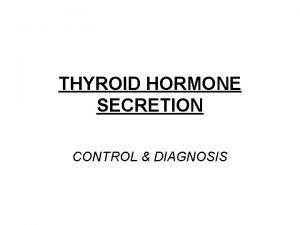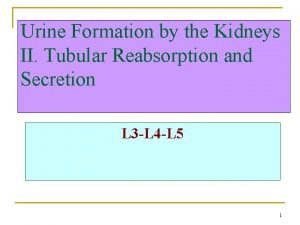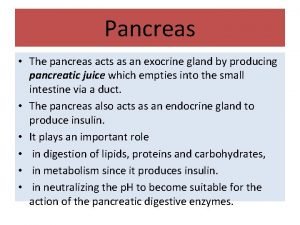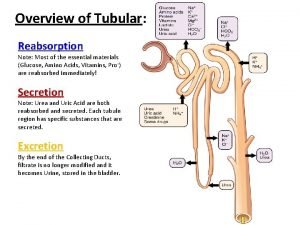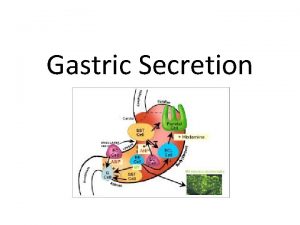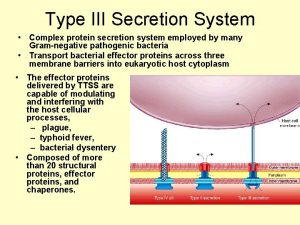Hormone Secretion Control Three Kinds of Regulation Neural











- Slides: 11

Hormone Secretion Control Three Kinds of Regulation

Neural Control Nerve fibers directly stimulate the endocrine organs to release hormones. The organs colored in blue are those connected to the nervous system. Example: During a fight or flight response nerve impulses travel through the sympathetic nervous system and stimulate the adrenal medulla, part of the adrenal glands. These glands release epinephrine an norepinephrine. Which increases blood flow, heart rate, dilates pupils. Etc.

Hormonal Control Glands primarily talk to each other and other organs through hormones. And this communication is organized into a hierarchy with each tier telling the next one down in the chain of command what to do. The hypothalamus is the president like in a business. With vice presidents and managers below it. The pituitary is responsible for delegating the work. It takes the signals from the hypothalamus and then sends out specific hormones that will communicates to other glands, the managers in this analogy. The manager glands then send out hormones that will signal to other parts of the body what needs to be done. All other glands are considered managers. The pancreas is a manager level gland but it is more isolated from the hierarchy.


Negative Feedback The managers send out signals with a particular goal in mind, such as stimulating the heart to beat faster. Once that job is done they signal to the hypothalamus or the pituitary gland to stop producing the hormones telling them to complete this action. This is called a negative feedback loop.

Humoral Control Humoral control of the endocrine system is achieved by monitoring the levels of different substances in the blood and other body fluids. If there is an imbalance, corrective actions are taken by the body to maintain homeostasis. Example: If blood glucose rises the pancreas releases insulin that promotes glucose uptake by the body. The result is that blood glucose then goes down. When blood glucose is too low the pancreas secretes glucagon. Which causes the liver to break down glycogen which increases blood glucose.

Hormones and Homeostasis The body tends to correct imbalances within itself and always strives to maintain homeostasis. Like a thermostat, if the body’s temperature drops the hypothalamus tells the thyroid to increase metabolism to increase energy output and increase the body’s temperature. The sympathetic nervous system is stimulated to begin shivering. If the body’s temperature is to high then the hypothalamus stimulates the sympathetic nervous system to sweat.


Critical Thinking What kind of affects would climbing a very high mountain have on the body? What kind of things would the body need to do to maintain homeostasis? How would the endocrine system play into this?

https: //www. youtube. com/watch? v=Rpadzv. O 5 JGM

Critical Thinking What kind of affects would climbing a very high mountain have on the body? Cold, low oxygen, stress. What kind of things would the body need to do to maintain homeostasis? Bring up and maintain body temperature, adjust to low oxygen, dealing with the rigors and danger of the climb. How would the endocrine system play into this? Hypothalamus would signal the thyroid to up metabolism. Produce more heat and energy. Then it would signal the sympathetic nervous system to direct the body to begin shivering. The adrenal glands would begin the stress response. Kidneys secrete erythropoietin. Increasing blood cell count. Increasing available oxygen in the body.

